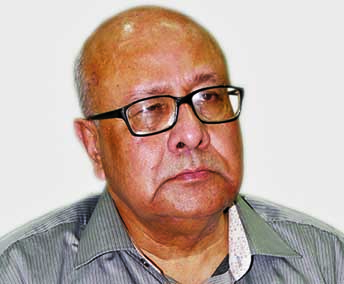
Sanwar Hossain :
Khondkar Ibrahim Khaled is a prominent economist, former Deputy Governor of Bangladesh Bank and Chairman, Bangladesh Krishi Bank. He is serving as Faculty member of BIBM. He shared his views and suggestions with the New Nation on economic trends of Bangladesh.
Should banks provide more support to loan defaulters with more loans rather than grilling and suing them to recover loans?
Khondkar Ibrahim Khaled: The course of action will depend on whether the loan was given through proper judgment and assessing recoverability. If so, the loan receiver can be considered with more loans and further support if his need is genuine. If not, if it was not properly judged and not recoverable then banks can go for grilling and sue them in court to recover such loans. There are two groups who take loans: the first group are not loan defaulters and were properly assed. If such people need loans they should be supported with more time and additional loans.
But, there is other group which has intention to loot money in the name of loans. Such case should not be considered with additional support. Many big groups take loans more than TK 500 crore and are facilitated through restructuring of loans, but often they did not give back money to the banks. This group should not enjoy further loan facilities and banks must go suing them to recover loans usually. This second group does not payback. They are willful defaulters, loan snatchers and should be punished.
The year 2017 was a bad year for the banking sector is not right. Loan scams, looting plans were knitted during the years of 2014, 2015, 2016 and we are viewing the result in 2017. During those three years mass looting happened from banks and in third step in 2017 it was mainly unearthed.
How do you view loan scams like Hallmark, Bismillah Groups and role of banks?
Khaled: Outsiders cannot take out loans without help of insiders. So if loan scam happens due to unholy collaboration, the loan snatchers and inside collaborators should be punished.
How income inequality is affecting our life standards?
Khaled: Income inequality is now in alarming state. In 1974 GINI coefficient was only .24, now it has gone up to .48. The inequality destroys social harmony.
With a missing middle class from the economy how we are looking forward to achieve sustainable development?
Khaled: Goal of welfare economy is to expand the middle class. In our situation, it is squzzing the poor class and making the rich richer. The middle class is not at least expanding. Now it is not an ideal situation for sustainable development. For sustainable development middle class must be broadened.
How the state of unemployment is shaping our economic future?
Khaled: Problem of unemployment was always there but now it has become acute. In an area of 54000 sq miles 16 crore people live. It is an unnatural situation compared to any other countries of the world. So the solution is not very simple. We can try to develop human resources and send them abroad for earning. It will create multiple good effects like employment generation, keep good relationship with other countries, and increase foreign earnings for the country.
How the state of corruption is affecting development of the country?
Khaled: Corruption is normal with capitalist economy as we have seen in the USA but it is deplorable in a welfare economy as we visualize in independent country. We cannot afford corruption in a poor country like ours though it is very high at this moment in the country. We can minimize corruption only if we can punish corrupt and highly influential people.
How should we maintain our export growth and what manufacturers should focus on to hold the market share in global economy?
Khaled: It will depend on diversity of products. We are heavily depended on RMG export. We have to find out new markets for existing products, new products to the existing markets. In my opinion the next product can be Information products of IT sector. It is in the initial stage, government should address the sectoral problems with proper support and facilities to multiply export earnings from the sector.
How do you view rising food grain import and rising food cost?
Khaled: It was a failure that food stock went to critical minimum level. Food storage must always to checked and be kept above the minimum level. Even then we may have to import food which should be done at proper time and proper quantity.
What will you suggest for reducing illicit money flow from the country?
Khaled: It is a challenge for most of the countries of the world and never can be stopped fully. However, at present illicit transfer of money is around 30 to 35 percent of GDP. It is suggested that financial intelligence unit should be strengthened with proper training and supports.
What we should do for accelerated growth of the country’s economy?
Khaled: A few steps can be suggested: continued peaceful environment in the country, reduction of corruption, one stop service for investment in its true sense, easy availability of energy without any disruption in supply and appropriate policy support for investments.
In 2018, economy will experience slow growth. As election is nearing, investors will invest less, inflation will rise. More than 6 per cent of inflation rise will be have visible effects in lifestyle.

